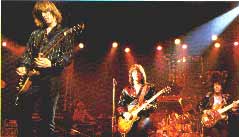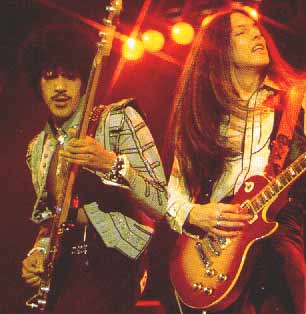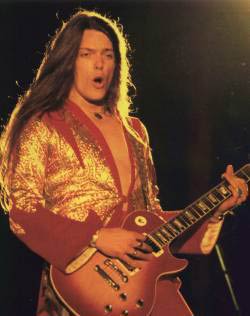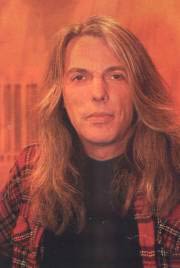
One pictures that probably sums up the whole attitude of rock'n'roll, is the cover of Thin Lizzy's Live And Dangerous album. There's Phil Lynott, clad in black, eyes shut, bass held aloft... everything rock stands for in fact! In the background stands a Les Paul toting figure with waist-length hair one part of a twin guitar force-field that served in the band longer than any other. Scott Gorham worked with many guitar partners in Thin Lizzy - John Sykes, Gary Moore and Brian Robertson, amongst others. The story of the band is, of course, legendary - the ups and downs and excesses are well documented elsewhere, but here, Scott looks back on the band's glory days and offers insight into how those infamous twin lead arrangements came about.
Surprisingly, when Thin Lizzy split, Scott left the band under a cloud, locking away his guitars for a number of years until he felt the stage calling him once again. How does he think his guitar style changed as a result? "It's changed quite a bit, really. There are two things really. I think I've got more aggressive and a lot more confident. It might sound kinda funny, but when I left Lizzy, I walked out not really liking the way I played guitar at all. Maybe it was my state of mind or whatever, but I walked out thinking I was so shit! I think that was one of the reasons why nobody heard from me for a while, because I didn't want to play with anybody, I'd lost a lot of confidence and the guitars went straight up into the attic and I didn't even touch them. Then my mental state got a lot better and I began to get hungrier for it again and a lot of people were giving me a kick in the ass to get back up there...

"So I started to pick up the guitar
and what I would do is go out and do sessions for other people. People were calling me up
all the time to do sessions - a lot of the time for people I didn't even know. I'd never
really considered myself a 'session guitarist' and I didn't want to get into it, but there
were friends of mine who'd call up and say, 'Listen, can you come down and put some guitar
on this or that?' and I'd think that it sounded pretty comfortable and I'd go and do it
and then another friend would call up and I'd feel a bit stronger and it would start
to feel a lot easier for me to get out there and get a big-time taste for it."Then,
when I got my band, 21 Guns,together, the guys in the band were giving encouragement from
the guys and so I was just blasting away there!"
He hasn't been tempted back
into the twin guitar harmony area?
"In the first place, I think I did it for so long that there was no mystery for me
there any more. I think I thought that, at the back of my mind, if I did go and do that
sort of thing, people would think, 'Ah, he's doing
a Thin Lizzy thing...' and that was a major thing for me to avoid: being tagged in any way
shape or form with Thin Lizzy. Although I loved being in the band and doing the tours and
all that, I was getting into a whole new thing."
Playing in a twin lead guitar format with Lizzy was a big part of Scott's life for so long
- so let's talk about guitar harmony!
"You know, there was never really anything terribly scientific about it! None
of us were really schooled musicians, even None of the guys who went through Thin Lizzy
were like your basic schooled guys. Obviously everybody knew their way around the neck...
Some of the harmonies were really obvious thirds fifths and so on, but you started out
with your root line like the basic part to 'The Boys Are Back In Town' and all we would do
is run it over and over and gradually put it together piece by piece. We'd work out the
beginning and, if it
sounded great, we'd move on to the middle. It was really just going through each section
and picking the notes out.
"Phil would be on the bass and he would be
peddling whatever note was going down so that we could get a chordal thing happening, and
me and the other guitarist would just sit down and work out the harmonies as we
went."

Were there ever any disagreements?
"No, not really. Musically, there were never really any arguments in Thin Lizzy as
far as who would take what solo or what arrangements we were going to come up with. The
music seemed always to happen by itself, it was all the extra-curricular shit we used to
argue about! There would be business decisions or personality clashes,
but somehow the music always seemed to take care of itself.
"Musically, the only things I disagreed with would be some of the songs we did
and
the way it was produced, sound-wise."
Which period of the band did Scott enjoy the most?
"The first album was a real pain in the ass because I didn't know what the hell I was
doing in the studio! The Jailbreak album was a fun album to make because the songs sounded
a lot better and everyone was a lot more creative and ideas were just flying out of
everyone's beads all over the place! I think that, song-wise, you can really tell that,
y'know? It was like now we're really happening - we're a band at this point. It was
surprising that it took these albums for us to mature into that position, especially when
you'd got a guy like Phil who was such a good songwriter and Brian Robertson was such a
good guitar player... In fact, I think that the period when Brian
was in the band was probably one of our most creative.
"Ater Jailbreak there was Johnny The Fox and Live And Dangerous, followed hy
Bad Reputations. That was the last album that Brian was on - in fact he's only
on two tracks on that record. Then Gary Moore came in and we did the Black Rose
album. Gary's a hell of a guitar player; he tended to get real clinical about
things, which
is ok. I mean, I thought that he and I as a team were pretty good; I've heard live tapes
of what he and I
had done on stage and they really do sound great. A lot of times with Lizzy, things
seemed to get so
frantic on stage - cranked up and all that - that sometimes it seemed more than a
little chaotic,
but listening back it was actually pretty together"

In what sense was Gary Moore 'clinical'?
"Well the tuning had to be ridiculously perfect [laughs], which I'm all in
favour Ok but Gary would pick things out and say they weren't in tune when everyone else
thought they were spot on. It seems like maybe he got a bit too picky sometimes to
a point where it would sound like we were being really careful. It kinda lost a
little bit of that looseness which was a Lizzy thing! But he's a great player and we
came up with some great harmony bits
and some really great lines... 'Waiting For An Alibi' and 'Black Rose' are stunning."
They were still worked
out the same way - it was simply a matter of sitting down and going through all the parts,
one piece at a time?
"Yeah, although I think that most of those were Gary's lines. He was into the
real Celtic thing at the time -
I think he and Phil wrote must of 'Black Rose'. "Then there was Snowy He was kinda
thrown into a situation that he didn't feel comfortable with. He was a blues guitar
player 100 per cent, thrown into a rock band and a little bit of chalk and cheese
went on there..."
There was Midge Ure, too.
"Yeah, well Midge only came in when Gary quit half way through an American tour and
Midge came out and
finished the tour and did the Japanese tour we had going. I have to admit that I
admired him for doing that because on the plane out to New Orleans he actually
had a Walkman oi listening to the album we'd given him, learning the parts! Ater he
landed, I went up to his hotel room and sat with him saying, 'Ok, you're going to be
doing this bit and I'm going to be doing that. Now we do this harmony bit here...' And we
were out that night, doing the gig - and he pulled it off! He might have seemed a bit
of an odd choice but no one can say that we ever took the easy route!"
John Sykes was Scott's last guitar partner in Lizzy.
"John was great. He's a real good player and I think the way we ended Lizzy off
with Thunder And Lightning
was the right way to do it. It was just unfortunate that we all knew that it was going to
be the last album
and the last toun For a while I felt real bad about that because he wasn't getting a fair
shot, but he
did quite well out of it and went on to join Whitesnake..." Scott Gorham has now made
his home in England.
"I really love it here and when I say I'm going home, I mean I'm coming back to
England.
It really pisses my dad off!"

